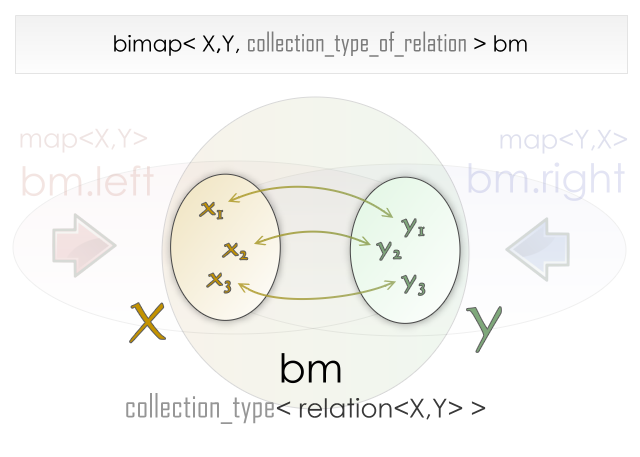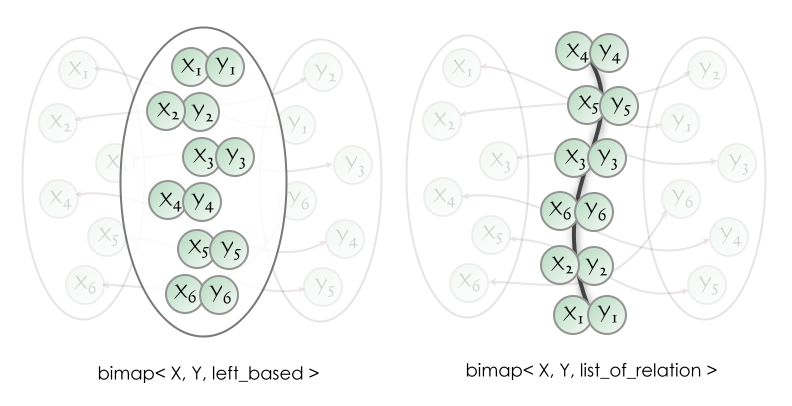 Boost
C++ Libraries
Boost
C++ Libraries
...one of the most highly
regarded and expertly designed C++ library projects in the
world.
— Herb Sutter and Andrei
Alexandrescu, C++
Coding Standards
 Boost
C++ Libraries
Boost
C++ Libraries
...one of the most highly
regarded and expertly designed C++ library projects in the
world.
— Herb Sutter and Andrei
Alexandrescu, C++
Coding Standards
Being able to change the collection type of the bimap relation view is another very important feature. Remember that this view allows the user to see the container as a group of the stored relations. This view has set semantics instead of map semantics.

By default, Boost.Bimap will base the collection type of the relation on the type of the left collection. If the left collection type is a set, then the collection type of the relation will be a set with the same order as the left view.
In general, Boost.Bimap users will base the collection type of a relation on the type of the collection on one of the two sides. However there are times where it is useful to give this collection other constraints or simply to order it differently. The user is allowed to choose between:
![[Tip]](../../../../../../doc/src/images/tip.png) |
Tip |
|---|---|
The first two options and the last produce faster bimaps, so prefer these where possible. |

The collection type of relation can be used to create powerful containers.
For example, if you need to maximize search speed, then the best bidirectional
map possible is one that relates elements from an unordered_set
to another unordered_set.
The problem is that this container cannot be iterated. If you need to know
the list of relations inside the container, you need another collection
type of relation. In this case, a list_of_relation
is a good choice. The resulting container trades insertion and deletion
time against fast search capabilities and the possibility of bidirectional
iteration.
#include <iostream> #include <string> #include <boost/bimap/bimap.hpp> #include <boost/bimap/list_of.hpp> #include <boost/bimap/unordered_set_of.hpp> struct english {}; struct spanish {}; int main() { using namespace boost::bimaps; typedef bimap < unordered_set_of< tagged< std::string, spanish > >, unordered_set_of< tagged< std::string, english > >, list_of_relation > translator; translator trans; // We have to use `push_back` because the collection of relations is // a `list_of_relation` trans.push_back( translator::value_type("hola" ,"hello" ) ); trans.push_back( translator::value_type("adios" ,"goodbye" ) ); trans.push_back( translator::value_type("rosa" ,"rose" ) ); trans.push_back( translator::value_type("mesa" ,"table" ) ); std::cout << "enter a word" << std::endl; std::string word; std::getline(std::cin,word); // Search the queried word on the from index (Spanish) translator::map_by<spanish>::const_iterator is = trans.by<spanish>().find(word); if( is != trans.by<spanish>().end() ) { std::cout << word << " is said " << is->get<english>() << " in English" << std::endl; } else { // Word not found in Spanish, try our luck in English translator::map_by<english>::const_iterator ie = trans.by<english>().find(word); if( ie != trans.by<english>().end() ) { std::cout << word << " is said " << ie->get<spanish>() << " in Spanish" << std::endl; } else { // Word not found, show the possible translations std::cout << "No such word in the dictionary" << std::endl; std::cout << "These are the possible translations" << std::endl; for( translator::const_iterator i = trans.begin(), i_end = trans.end(); i != i_end ; ++i ) { std::cout << i->get<spanish>() << " <---> " << i->get<english>() << std::endl; } } } return 0; }
Each collection type of relation has different parameters to control its
behaviour. For example, in the set_of_relation
specification, you can pass a Functor type that compares two types. All
of the parameters are exactly as in the standard library containers, except
for the type, which is set to the bimap relation and the allocator type.
To help users in the creation of each functor, the collection type of relation
templates takes an mpl lambda expression where the relation type will be
evaluated later. A placeholder named _relation
is available to bimap users.
The following table lists the meaning of the parameters for each collection type of relations.
|
name |
Additional Parameters |
|---|---|
|
|
Not a template. |
|
|
Not a template. |
|
|
KeyComp is a Functor that compares
two types using less than. By default, the less-than operator
is |
|
|
HashFunctor converts the
EqualKey is a Functor that
tests two relations for equality. By default, the equality operator
is |
|
|
Not a template. |
|
|
Not a template. |
|
|
Not a template. |
Consider this example:
template< class Rel > struct RelOrder { bool operator()(Rel ra, Rel rb) const { return (ra.left+ra.right) < (rb.left+rb.right); } }; typedef bimap < multiset_of< int >, multiset_of< int >, set_of_relation< RelOrder<_relation> > > bimap_type;
Here the bimap relation view is ordered using the information of both sides.
This container will only allow unique relations because set_of_relation
has been used but the elements in each side of the bimap can be repeated.
struct name {}; struct phone_number {}; typedef bimap < tagged< unordered_multiset_of< string >, name >, tagged< unordered_set_of < int >, phone_number >, set_of_relation<> > bimap_type;
In this other case the bimap will relate names to phone numbers. Names can be repeated and phone numbers are unique. You can perform quick searches by name or phone number and the container can be viewed ordered using the relation view.